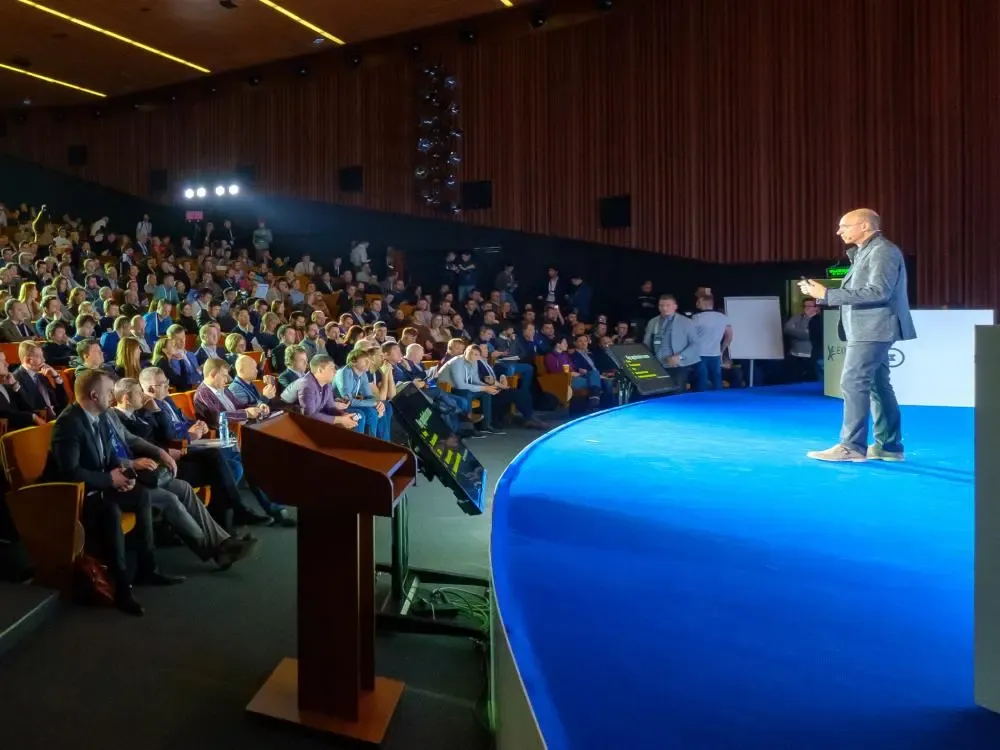Services
SERVICES
SOLUTIONS
TECHNOLOGIES
Industries
Insights
TRENDING TOPICS
INDUSTRY-RELATED TOPICS
OUR EXPERTS

May 27, 2025
LMS software generally focuses more on the administration and management of the learning process but still needs to be equipped with a wide range of LMS features that cover other aspects of online education.
Preparing learning resources or quizzes for lessons and exams with the help of authoring features like customizable templates, collaboration tools, and content repurposing.
Combining training content into learning objects, units, and courses and making them available to students at specific stages of the learning process.
Integrating materials in different formats (images, videos, PDFs, etc.) from multiple sources into your learning content.
Cataloging learning content with metatags, storing it in a centralized database, and retrieving it through smart search engines with multiple filters.
Delivering content with multi-device and offline access support, mobile/desktop synchronization, and catalogs with summaries and reviews.
Setting multiple user roles, such as learners, trainers, or admins, and respective permissions to access specific user interfaces, content, and features.
Automating the admin’s routine user management tasks, from user registration to LMS course enrolment and creation of classes or learning groups.
Automating the assignment/reassignment of courses linked to an employee's role or department to simplify the work with a large staff and reduce the risk of errors.
Cross-checking students’ and teachers’ availability to plan regular virtual meetings or ad-hoc lessons after completing a given module or task.
Triggering real-time alerts and reminders based on predetermined rules to notify students of upcoming events, deadlines, and newly published content.
Designing, planning, supervising, and evaluating exams via authoring, scheduling, proctoring, and automated test grading tools, respectively.
Monitoring student performance, learning content usage, subscriptions, and course sales via user-friendly dashboards to assess the effectiveness, quality, and profitability of your educational services.
Enabling users to purchase courses and other services with shopping cart, checkout, credit card verification, payment processing, and invoicing features.
Capabilities to fine-tune learning management workflows to the company’s evolving needs.
Implementing contests, teamplay, storytelling, leaderboards, badges, rewards, and other game mechanics to foster student motivation and retention.
Providing students with personalized training paths and educational content recommendations based on the analysis of their learning patterns and skills, either through rule-based systems or artificial intelligence-based education tools.
Implementing chats, forums, wikis, and social media features to promote peer-to-peer discussion, collaboration, and sharing of personal achievements.
Facilitating learning on the go through bite-sized educational content and activities, voice commands, and push notifications or reminders.
Combining traditional and online education via video conferencing tools, virtual classrooms, and scheduling features to coordinate in-class and online learning activities.
Creating realistic learning experiences powered by augmented reality or virtual reality to enhance professional training with immersive simulations of real-life working scenarios or stimulate learner engagement with 3D visualizations and image overlays to provide additional insights and superior interaction.
The holistic nature of a custom LMS can be further amplified by integrating it with other software systems. Here are a variety of applications that organizations can integrate with their custom LMS to create a synergistic EdTech ecosystem.
Streamline corporate training and new employee onboarding by providing role-based access to personalized learning paths and content based on the employee’s role, responsibilities, and skills.
Enable relevant customer data exchange with your LMS to optimize learner retention strategies and foster experience personalization.
Promote sociability and collaboration among students, enable sign-up via social profiles, and allow learners to share achievements with each other on their social media.
Ensure smooth eLearning content creation, uploading, editing, and storing in your custom LMS without assistance from the IT team.
Facilitate live lessons, lectures, and tutoring sessions with geographically distributed students and record lessons for later access.
Discovery
Analyzing the company’s business goals and target audience and its needs to outline the functional and non-functional requirements for the future LMS solution.
Solution design
Designing the software’s architecture, choosing suitable technologies, and creating the UX/UI design with wireframes and interactive prototypes.
Planning
Defining the project scope, mapping out development activities with key milestones, selecting the software development methodology, and planning the project’s budget.
App development
Performing front-end and back-end software development and establishing integrations with other systems.
Quality assurance
Conducting various types of tests to detect and fix issues in the custom LMS and ensure it functions as expected.
Launch
Rolling out the solution to the target environment, making it available to users, and performing user onboarding.
Maintenance & support
Monitoring and optimizing the software’s performance, fixing bugs, implementing security patches, and upgrading functionality based on user feedback or changing business needs.
There are several types of custom learning management systems that serve different needs depending on the organization’s goals and learner audience.
An entry-level solution with only essential features for a small to mid-sized company’s internal use.
A midsize application with a standard set of features and integrations.
A complex system with advanced features and multiple integrations.
A solution for eLearning service providers offering classes and online courses. This type of LMS should focus on analytics and ecommerce-related features to help assess and meet specific needs of your customer base, maximizing the profitability of your educational services.
Enterprise LMS software for companies investing in eLearning for upskilling initiatives. Features to prioritize include multitenancy and role-based access to differentiate tools, content, and interfaces based on users’ business roles and specialization.
An application for educational institutions willing to adopt digital teaching approaches. The essential features for this type of LMS are blended learning to combine different teaching methods, gamification to entice students, and proctoring for academic integrity.
A custom LMS solution deployed on the organization’s own hardware and servers. This deployment model ensures safer data storage and access, solid data security, and extensive customization options but requires higher upfront costs and significant maintenance efforts.
An application hosted on cloud infrastructure that is managed and maintained by the cloud service provider. While this option offers high scalability and accessibility, it implies limited control over the solution’s infrastructure, restrictive licensing options, potential cost creeps, and the risk of vendor lock-in.
If you plan to create a complex, feature-rich solution, consider first implementing a minimal viable product (MVP), prioritizing the most essential features like course building and user management. This way, you can gather feedback from early users to shape your LMS further.
To make sure that users can easily create and use learning materials and perform other operations, create user-friendly interfaces and intuitive navigation for faster LMS adoption and smooth user experiences and conduct beta-testing before the general release.
For protecting sensitive data and making learning workflows secure, equip your LMS with comprehensive security mechanisms, such as data encryption, role-based access control, and multi-step authentication.
When developing an LMS from scratch, keep system scalability in mind to create a solution that can support the increasing number of users, learning courses, instructors and learners, and complex learning scenarios without it compromising the system’s performance.

We offer advisory guidance for LMS implementation, helping you conceptualize your future solution, choose a suitable tech stack and deployment model, draw up a detailed project roadmap, and navigate through technical challenges throughout the LMS adoption journey.
Our team builds bespoke LMS solutions from the ground up, equipping it with rich functionality to cover your specific learning management workflows and ensuring it delivers positive user experiences.
We revamp your existing LMS system to align it with the evolving business needs and latest tech trends, improve its performance, security, and scalability, and reduce software maintenance costs.
We choose from a wide spectrum of programming languages, frameworks, and third-party services to gather an effective technology stack for your learning management system development project.
Frontend | ||||
|---|---|---|---|---|
Backend | ||||
Mobile |
|
| ||
Cloud |
|
|
| |
3rd party integrations |
|
|
|
|
The pricing for developing a custom LMS depends on several cost factors, encompassing the solution’s architecture (including potential multitenancy) and functional scope (modules and features), development tech stack, deployment model, user base, and integrations.
The application development timeframes for a custom LMS from scratch can range from several months to one year, with the development process taking longer for solutions with complex functionality and multiple custom integrations.
Organizations should opt for custom LMS development when they:
A custom LMS refers to a solution built from scratch to precisely match a company’s unique learning management workflows. A customizable LMS, in contrast, is an off-the-shelf learning platform that its adopters can configure within certain limits to adapt the standard interface and functionality to their business needs using custom or pre-built plugins and integrations. Examples of such customizable platforms include Moodle, TalentLMS, and Canvas.
A standard development team includes a project manager, a business analyst, UX/UI designers, back-end and front-end developers, QA engineers, and a DevOps engineer. The team can be augmented by other niche specialists, such as AI engineers, depending on the desired LMS functionality.

Service
Explore Itransition’s eLearning software development services, along with key application types, features, integrations, technologies, and guidelines.

Insights
Explore the value of machine learning in education. View its top use cases and real-life examples and consider implementing ML into your educational process.

Case study
This is how Itransition delivered a platform-based new hire training portal for PayPal, helping to reduce the learning curve for newcomers.

Service
Discover the types of mLearning apps, their functionality, and advanced tech stack, along with implementation costs, benefits, and challenges.

Case study
Learn how Itransition delivered a suite of custom conference management software and enriched it with bespoke modules automating event organization.

Insights
Learn about the interactive potential of augmented reality technology in education, its use cases in schools, and its impact on learning outcomes.

Insights
VR-powered education is taking off globally. Learn about its promises and success stories from this overview of latest developments.

Insights
Discover the steps, payoffs, and challenges of adopting a knowledge management strategy, along with popular knowledge management software on the market.